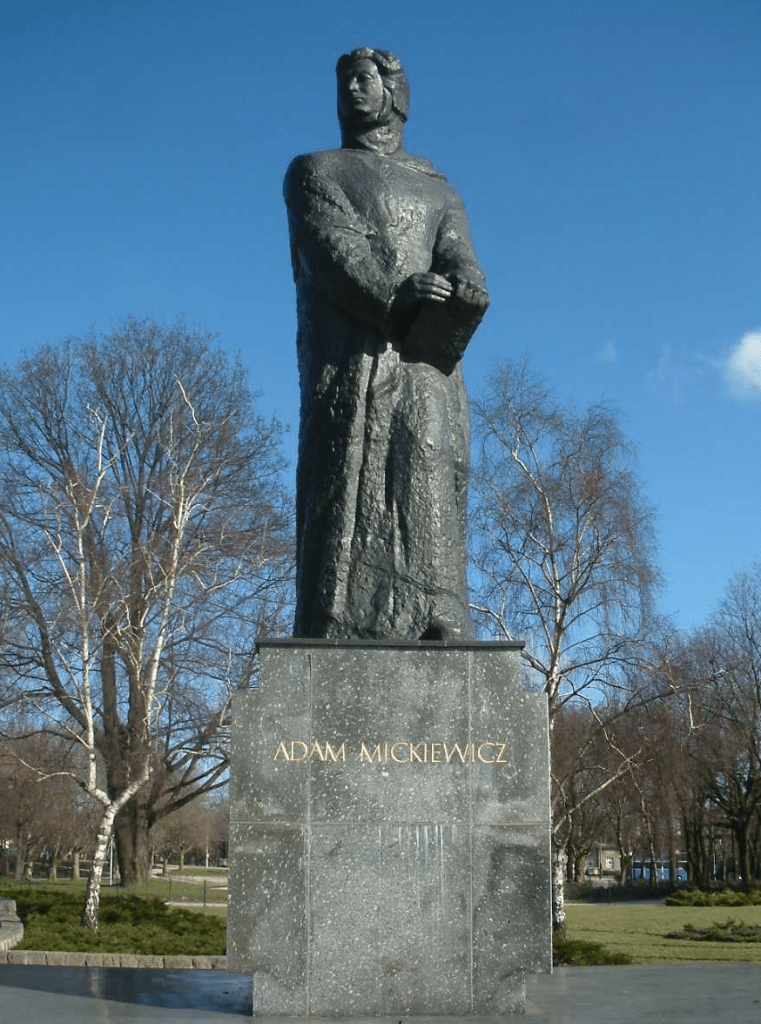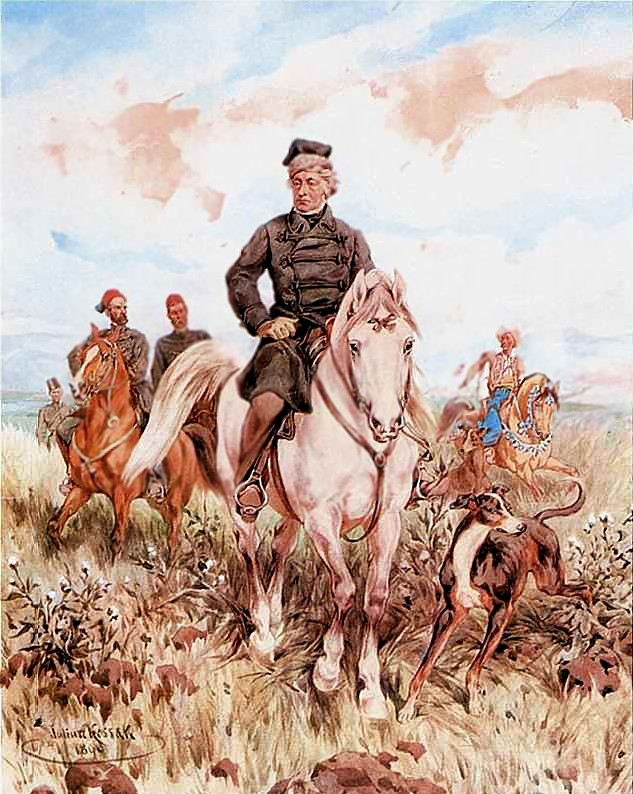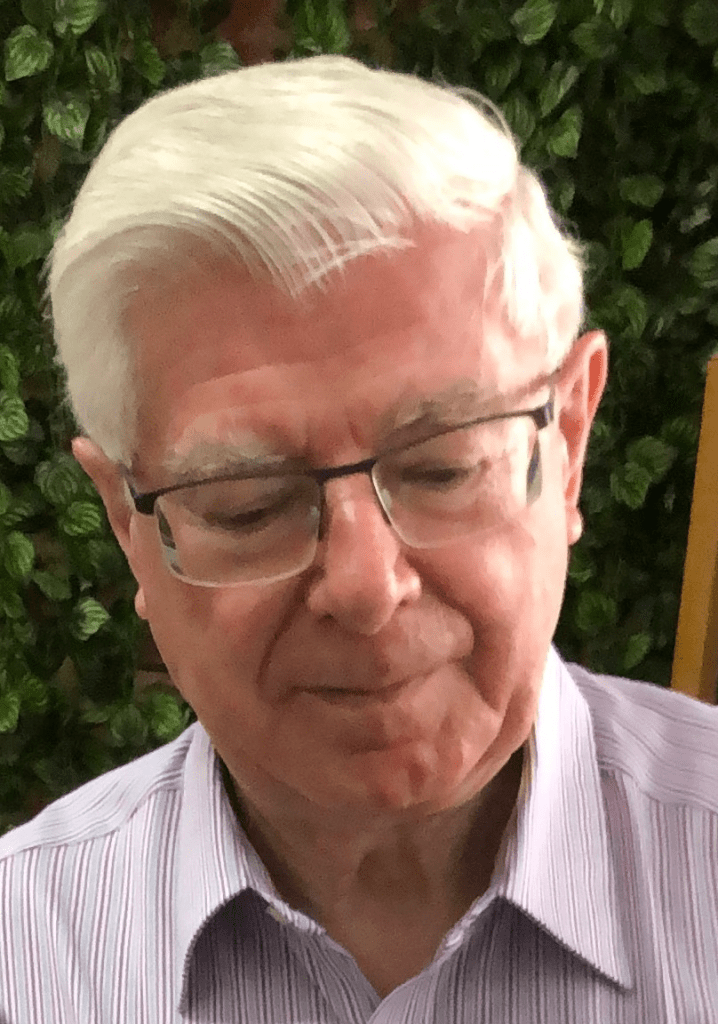Jerzy Danielewicz, Mateusz Stróżyński
Adam Mickiewicz (1798–1855) is the Dante, Shakespeare, Goethe and Pushkin of Polish literature. Not only was he the greatest poet in the history of the Polish language: he also exerted an unparalleled influence on the formation of Polish national identity throughout the 19th and 20th centuries. In 1795, Poland ceased to exist as a legal entity for 123 years as a result of imperialistic expansion on the part of neighbouring powers: Prussia, Austria, and the Russian Empire.
In his great poem, Pan Tadeusz, which has since become the Polish national epic, Mickiewicz revealed his sense of confinement: “For I was born enslaved, chained in my crib” (11.77). He died in 1855 and never saw the independence of his fatherland (which was only regained in 1918). In 1815 he began to study Classics at the University of Vilnius, and quickly joined two student organisations, the “Philomaths (“science-lovers”) and the “Philareths” (virtue-lovers) which stoutly opposed all Russian oppression of the Poles. In the autumn of 1823, when he was teaching Latin in the city of Kaunas, he was arrested by Russian authorities and then sent into exile. He never returned to Poland, spending the rest of his life mainly in Paris.
Mickiewicz was deeply learned in Western history, literature, philosophy, and Christian mysticism. He was invited to teach a course in Latin literature at the Academy of Lausanne (1839–40), followed by a course in Slavic literature at the Collège de France (1840–4). When he was expelled from the Collège because of his religious and political views, he began supporting the revolutionary wave that swept over Europe in 1848, and died trying to form a Polish “legion” in Constantinople that was meant to fight on the side of the Western powers in the Crimean War against Russia.
A selection of metaphysical poems by Adam Mickiewicz has just been published by Brill in open access here. The poems were translated into English by Mateusz Stróżyński and Jaspreet Singh Boparai, many of them for the first time. Introductory studies and extensive commentaries on the poems were contributed by the editors, Mateusz Stróżyński, and the eminent Mickiewicz scholar Jerzy Fiećko (of Adam Mickiewicz University). The volume shows Mickiewicz’s position in a long European metaphysical and mystical tradition that extends from Graeco-Roman antiquity to the Romantic period. He was fascinated by Christian Platonic authors such as St Augustine and Pseudo-Dionysius the Areopagite, as well as by Dante, and mediaeval and early-modern Christian mystics.
Below we present four of the poems included in the aforementioned volume, in the original Polish, in the English versions by Stróżyński/Boparai, and new translations into Greek and Latin that have been prepared by Jerzy Danielewicz, an Antigone author and a specialist in Greek poetry. It is worth noting that, even if the English translations (like the Greek and Latin ones) try to follow the Polish original as closely as possible, readers who cannot read Polish may notice some divergences between the English on the one hand, and the Greek or Latin on the other.
This selection is a glimpse into the greatness of Mickiewicz’s poetry, and the difficulties it presents for translators, regardless of the language. Above the Water Great and Clear… is a sophisticated elaboration of the ancient and mediaeval Platonist motif of the soul as a mirror reflecting God and the created universe; this alludes to an experience Mickiewicz had while contemplating the Alps over Lake Geneva. Gobs Who Yell in the Name of the People… is a short meditation on the political and social movements and the demagogues who lead them, concluding with an ambiguous reference to the Third Beatitude from the Gospel of Matthew (5:5).
I Shed Pure Springs of Tears… is one of the most famous poems in Polish literature; it is all but impossible to translate due to Mickiewicz’s daringly innovative use of poetic language, which has more in common with late 19th– and 20th-century tendencies than those of Mickiewicz’s own time. It can be read as both an exiled poet’s mid-life reckoning with his life and, at a deeper level , as an example of certain confessional and ascetic dimensions within Christian spirituality. My Corpse Is Sitting Here… can also be simultaneously understood in biographical terms (as a poignant exploration of the nostalgic memories and emotional crises of an émigré), or through the lens of the poem’s enigmatic Platonic images, including those of the body as a tomb of the soul, and the winged psyche flying to her eternal fatherland, with a mysterious, Beatrice-like female figure appearing at the end of the poem.

1. Above the Water Great and Clear… (tr. M. Stróżyński/J.S. Boparai)
Above the water great and clear,
The rows of stony mountains stood:
The watery transparent depths
Reflected their cold and black heads.
Above the water great and clear,
Dark clouds were running swiftly by,
And its transparent, darkling depth,
Reflected their unbodied shape.
Above the water great and clear,
Lightning struck and thunder roared;
And its transparent, darkling depth
Reflected light, and all was still.
The water, as pure as before,
Abides in peace, so great and clear.
I see this water everywhere,
I mirror all things faithfully;
I let those rocky faces pass;
I let thunder and lightning go.
The mountains stand and they must loom,
The rapid clouds must carry rain.
Lightning must strike and fade away.
And I must flow, and flow, and flow.
(In Lausanne, 1839–40)
Metre: Asclepiads (choriambically expanded glyconics) followed by glyconics
(tr. J. Danielewicz)
Ὕδατος μεγάλου καὶ καθαροῦ γ’ ὕπερ
ἑξῆς ἕστασαν ἄκριες,
ὕδωρ δ’ ἀντανέκλα λαμπροτάτῳ βάθει
σφῶν πρόσωπα μελάγχροα.
Ὕδατος μεγάλου καὶ καθαροῦ γ’ ὕπερ
μελαγχρᾶ νέφε’ ἔδραμον,
ὕδωρ δ’ ἀντανέκλα λαμπροτάτῳ βάθει
κείνων σχήματ’ ἀσώματα.
Ὕδατος μεγάλου καὶ καθαροῦ γ’ ὕπερ
ἤστραψεν, βρόμος ἐρράγη,
ὕδωρ δ’ ἀντανέκλα λαμπροτάτῳ βάθει
φάος, φθόγγος ἐπαύετο.
Ὕδωρ δ’ αὖ καθαρὸν ὡς πρότερον, πάλιν
διαυγὲς μέγα τ’ ἵσταται.
Ὕδωρ τοῦτο πέριξ ἀμφιχυθέν γ’ ὁρῶ
καὶ πάντ’ ἀντανακλῶ σαφῶς,
μέτωπ’ ὑψιπαγῆ δὴ στιβαρῶν πετρῶν
ἠδὲ καὶ στεροπὰς – ἐῶ.
Πέτρας ἑστάμεναι καὶ φοβέειν χρεών,
νεφέλας ὑετοὺς φορεῖν,
στεροπὰς βρομέειν, ἐν δ’ ὀλίγῳ φθίνειν,
ἐμὲ νεῖν, ἐμὲ νεῖν, νέειν.
Nad wodą wielką i czystą
Stały rzędami opoki
I woda tonią przejrzystą
Odbiła twarze ich czarne;
Nad wodą wielką i czystą
Przebiegły czarne obłoki,
I woda tonią przejrzystą
Odbiła kształty ich marne;
Nad wodą wielką i czystą
Błysnęło wzdłuż i grom ryknął
I woda tonią przejrzystą
Odbiła światło, głos zniknął.
A woda, jak dawniej czysta,
Stoi wielka i przejrzysta.
Tę wodę widzę dokoła
I wszystko wiernie odbijam,
I dumne opoki czoła,
I błyskawice – pomijam.
Skałom trzeba stać i grozić,
Obłokom deszcze przewozić,
Błyskawicom grzmieć i ginąć,
Mnie płynąć, płynąć i płynąć!

Gobs who Yell in the Name of the People… (tr. M. Stróżyński/J.S. Boparai)
Gobs who yell in the name of the people will bore the people,
The faces entertaining the people will bore the people.
The hands that fight for the people will be cut out by them;
The people will also forget their favourite names.
Soon this all will pass. And after noise, and roars, and work,
The meek, the dim and the small will then inherit the world.
(1833–6?)
Metre: Hexameters followed by hemiepes (tr. J. Danielewicz)
Buccae pro populo clamantes protinus ipsi
taedium erunt populo,
et facies, quae delectant populum, mox ipsi
non nisi taedium erunt,
atque manus, quae pro populo pugnant, resecabit
ipse brevi populus.
Nomina grata hodie populo populus dediscet
immemor auxilii.
Omnia praetereunt et post crepitum atque laborem,
postque brevem strepitum,
illorum heredes fient parvi, taciturni
atque hebetes homines.
Gęby za lud krzyczące sam lud w końcu znudzą,
I twarze lud bawiące na koniec lud znudzą.
Ręce za lud walczące sam lud poobcina.
Imion miłych ludowi lud pozapomina.
Wszystko przejdzie, po huku, po szumie, po trudzie
Wezmą dziedzictwo cisi, ciemni, mali ludzie.

I Shed Pure Springs of Tears… (tr. M. Stróżyński/J.S. Boparai)
I shed pure springs of tears
On my angelic, bucolic childhood years,
On my aloof and foolish youth,
On my coming of age; on my coming to fail.
I shed pure springs of tears.
(1839–40)
Metre: Glyconics with dactylic expansion (tr. J. Danielewicz)
ῥέεν δάκρυά μοι καθάρ’ ἀθρόα,
κατὰ νηπιότητ’ ἄλυπόν θ’ ἱλαρήν τ’ ἐμήν,
καθ’ ἥβην δὴ ὑπέρφρονά τ’ ἠλίθιόν τ’ ἐμήν,
κατά θ’ ἡλικίην, κακόποτμον ἐμοὶ χρόνον.
ῥέεν δάκρυά μοι καθάρ’ ἀθρόα.
Profluxere meae lacrimae liquidae, citae
in meam placidamque hilaremque puertiam,
iuventam in tumidam stupidamque item,
aetatemque virilem, etiam exitiabilem;
profluxere meae lacrimae liquidae, citae.
Polały się łzy me czyste, rzęsiste,
Na me dzieciństwo sielskie, anielskie,
Na moją młodość górną i durną,
Na mój wiek męski, wiek klęski;
Polały się łzy me czyste, rzęsiste.

My Corpse Is Sitting Here… (tr. M. Stróżyński/J.S. Boparai)
My corpse is sitting in the midst of you:
Looking you in the eyes, talking out loud,
My soul is gone, it wanders far away,
Lamenting in deep sorrow and despair.
There is a land, the homeland of my thought:
My lonely heart has many siblings there:
That land exceeds in beauty what is here;
The people there are dearer than my kin.
This is my refuge from worries or toil,
Or even fun. I sit there under firs,
And lay down in abundant, fragrant grass,
As butterflies and sparrows fly above.
I see her, softly walking from the porch,
She flies amid the meadows to the woods:
She bathes and swims within the sea of corn,
She shines down at us from the sky at dawn.
(1839–40)
Metre: Elegiac couplets (tr. J. Danielewicz)
Ὁππότ’ ἐμὸν τόδε σῶμα μεθ’ ὑμῖν τῇδε καθίζει,
ὑμῖν ὀφθαλμοῖς ἐμβλέπον, ὀξὺ λαλοῦν,
ἡ ψυχὴ μακρὴν τότ’ ἀποῦσ’, ἆ δειλή, ἀποῦσα
τῆλε πλανᾶται καί τ’ ἄχθεται, ἄχθεται, ἆ.
Ἔστιν ἐμοὶ χώρη, πατρίς γ’ ἐμέθεν διανοίης,
ἠδ’ ἐμέθεν κραδίῃ πολλοὶ ὅμαιμοι ἔνι,
χώρη καλλίων ταύτης εἰν ὀφθαλμοῖσιν,
πάντων συγγενέων φίλτερος οἶκος ἐμός.
Ἐνθάδ’ ἐν ἐργασίαις τε μερίμναις, καὶ δὴ ἀθύρων,
φεύγω ἐγώ. Καὶ ἐκεῖ δ’ ἧμαι ὑπαί ῥ’ ἐλάταις,
ἔνθ’ ἐπίκειμαι ἐγὼ τρυφερῇ τ’ εὐώδεϊ ποίῃ,
ἔνθ’ ἕπομαι στρούθοις ψυχιδίοις τ’ ἐλαφροῖς.
Ἔνθ’ αὐτὴν λευκὴν ὁρῶ ἐκ προδόμου κατιοῦσαν,
ὡς ὕληνδ’ ἡμῖν πίσεος ἐκ πέτεται,
λούεται ὡς ὑδρῆς γε χλόαισιν ἐν εἰαριναῖσιν
ἠδ’ οἷόν τ’ ἠὼς λάμπει ἀπ’ οὐρανόθεν.
Gdy tu mój trup w pośrodku was zasiada,
W oczy zagląda wam i głośno gada,
Dusza w ten czas daleka, ach, daleka,
Błąka się i narzeka, ach, narzeka!
Jest u mnie kraj, ojczyzna myśli mojej,
I liczne mam serca mego rodzeństwo,
Piękniejszy kraj niż ten, co w oczach stoi,
Rodzina milsza, niż całe pokrewieństwo.
Tam, wpośród prac i trosk, i wśród zabawy,
Uciekam ja. Tam siedzę pod jodłami,
Tam leżę śród bujnej i wonnej trawy,
Tam pędzę za wróblami, motylami –
Tam widzę ją, jak z ganku biała stąpa,
Jak ku nam w las śród łąk zielonych leci,
I wpośród zbóż, jak w toni wód się kąpa,
I ku nam z gór jako jutrzenka świeci.

Jerzy Danielewicz is Professor Emeritus of Classics at Adam Mickiewicz University, Poznań. A passionate translator of poetry, he has recently published an anthology of world lyric poetry from antiquity to the present under the title Cierń nostalgii (The Thorn of Nostalgia).